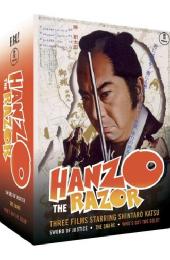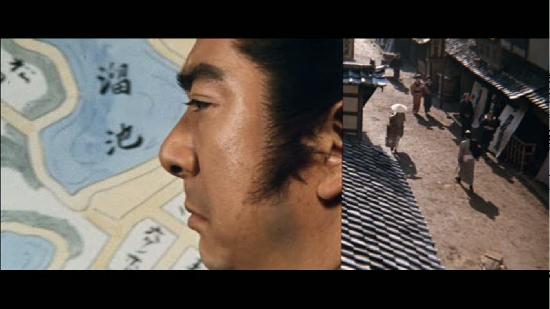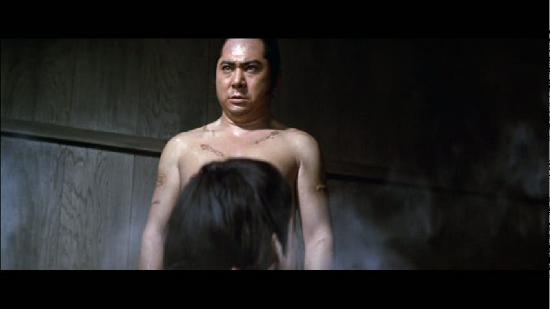Hanzo The Razor: Sword Of Justice / The Snare / Who's Got The Gold
Issued simultaneously, and at the same time, as the wonderfully debauched 'Female Prisoner Scorpion' Box Set, this triple DVD Box Set (housed in an incredibly sturdy box) is, once again, offered at an incredible RRP (a mere £12.99 - even of you pay RRP). Eureka seems to be on a mission to ensure that no collection should be without these demented, politically incorrect, culturally oblique 'masterpieces'. Better known for their 'Masters of the Cinema' series, Eureka are fast developing a reputation as serious rivals to Criterion in the U.S - and the transfers in this set are unimaginably good given the trashy subject matter.
What's notable about the 'Hanzo' set is that they are absolutely, irredeemably politically incorrect. They are utterly and totally indefensible with their crass treatment of women which often verges on the misogynistic, made even more offensive with their frequent 'they love it really' mindset. Like an un-cool teenager who has to take it too far,
'Hanzo' is the Samurai equivalent of our very own James Bond, though with Bond we have the good grace to imply most of his ill behaviour with women which can be dismissed with a cheeky wink and comments about him being a bit of a lad. No such luck here. There are no slow pans to a fireplace to avoid the blatant. Here we see it all. 'Hanzo', a Samurai Cop, is the least likely hero and ladies man in the world (a slightly overweight, dwarfish middle-aged man), is 'blessed' with a manhood the size of a decent Samurai sword. This strikes terror into the hearts of his enemies (what would Freud make of that?) and admiration from the ladies.
Hanzo frequently uses his 'tool' to pound out information from lady victims, who, half way through the abuse, naturally divulge all before begging for more. And yet...and yet...despite this unforgivable level of crassness, or maybe because of it, in a post-modern ironic analysis of the films (which, after all are now nearly forty years old), they're a lot of fun to watch. Why that should be will take some reasoning from a better psychologist than I.
Maybe it's because of the slapstick humour that abounds, or because the films (in common with the 'Female Prisoner Scorpion' series) have a very reasonable level of production value, shot on 35mm and with large casts, and decent sets. Maybe it's the sheer absurdity, the Japanese equivalent of Austin Powers but without the irony? Maybe it's the cultural gulf between Japanese and Brits where, as long as brutal sex is only hinted at by innuendo and suggestion, we Brits are OK with it? Who knows? But for under a tenner, it will be certainly worth a visit for those with a penchant for Japanese movies, and grind-house trash, or both.
Apparently Edo-period policeman Hanzo Itami originated in a Japanese comic, "Goyôkiba" created by Kazuo Koike, of "Lone Wolf and Cub" fame. Hanzo Itami (nicknamed: "the razor"), is a maverick law officer who defies his superiors. He tests torture techniques on himself first to see what works and he breaks the law whenever he thinks it's necessary, giving the distinct impression that he's above it. And he tells it like it is - regardless of the social status of the recipient. Of course, this was perfect for adaptation in the early seventies where the market for saucy sexploitation was really opening up in Japan.
Toho studios made three Hanzo films (all collected here) each with Shintaro Katsu (known for his twenty plus Zatoichi films) in the title role.
"Sword of Justice"
Oh Dear! The movie starts with our hero looking like he may be due for disciplinary dismissal. The only way to keep his job is to get out there and bring in enough crooks to save his bacon. With faithful ex-con sidekicks, Devil-Fire and Viper he manages to get out there and create enough aggro to bring on a tirade of attacking assassins. Hanzo is a dedicated 'people's man' - doing what's right and not necessarily following anybody's rules but his own. "Sword of Justice" was directed by Kenji Misumi, known for his action movies, and he uses the film to make some side-swipes at injustices in Japanese society. Another notable feature of the film is its period 'wah-wah' funk soundtrack, more like a Blaxploitation movie soundtrack than a Japanese Samurai sound-bed.
.
"The Snare"
In this second helping, shot a year after the first, its business as usual. Hanzo gets into a fight with a very senior official (a treasurer of the Mint) and it seems that he has got Hanzo by the proverbials. Investigating the mysterious death of a girl, Hanzo is lead to a ring of so-called temples where 'priestesses' are offering illegal abortions, and sex-slavery using visiting student girls. This feature was directed by Yasuso Masumura, who insisted on penning the film himself, and as a result it's an unrelenting sleaze-fest. No excuse for nudity is left unused. The violence also reaches hyper-real levels too with Hanzo taking on whole groups at a time, like Bruce Lee in 'Enter the Dragon' but without the six pack and looking like he's wearing a giant nappy. Sadly, the Blaxploitation soundtrack is nowhere to be heard in this one.
"Who's Got the Gold?"
Whoooo! We have a Scooby-Do like ghost plot for the third outing when side-kicks Devil-Fire and Viper go fishing near the treasury and are chased by what appears to be a female ghost. Un-frightened, Hanzo investigates and finds out that all is not what it should be at the treasury (surprise, surprise). Strangely, Yasuso Masumura wrote the script but passed on the Directing duties to unknown Yoshio Inoue - who never made another film!. This is really Hanzo by numbers and the franchise is already beginning to feel a little thin.
Overall
I really don't think that I should admit enjoying these films. They are utterly irredeemable from any sensible and intelligent viewpoint, crass in their treatment of women and utterly absurd on almost every level. But I did enjoy them tremendously (file under 'guilty pleasure') maybe because of all the above, rather than despite it. They are a cultural oddity, very much of their day and they reflect not only the mood of the period, but some weird 'lost in translation' version of it. The fact that this set comes so handsomely packaged with first class booklets to boot (by British expert of Japanese cinema Tom Mes) and with really excellent prints (with few specs and one instance of audio loss highlighted in the booklet), matched with the best price for a box-set registered by this reviewer EVER, means that this is thoroughly recommended. But only if you like both Japanese cinema and pure trash in equal measure.



































Your Opinions and Comments
Be the first to post a comment!